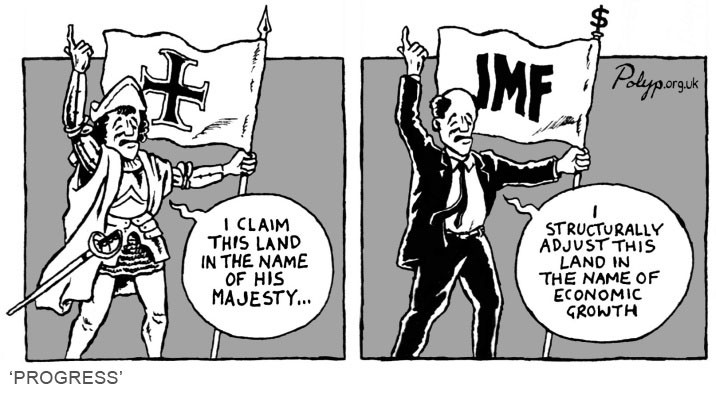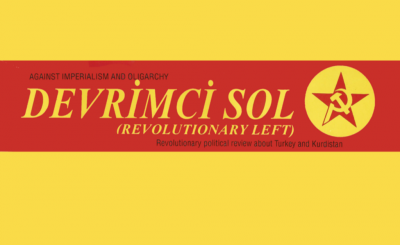The international situation, after the end of World War II, shows that the alliances and the balance of powers from the pre-war period were completely destroyed, and apart from the capitalist system and the international communist movement, within the capitalist system itself, this balance and relations underwent a radical change. Britain’s leading position, as the most powerful force in the capitalist system, which begins to weaken more and more at the beginning of the twentieth century, is already occupied by the United States. The imperialist-capitalist system, in order to find a way out of its crisis, which has entered a new phase, together with the increase in the power of the communist movement’s struggles and the struggles for national liberation, is beginning to remodel under the influence of the United States, which is undoubtedly dominant economic, military and political factor.
After the war, the imperialist exploitation system plunged into a multifaceted and deep crisis. On one hand, the national liberation wars, as an external factor for the system, create a growing tension that breaks traditional links of exploitation, and on the other, this colonial system (classical colonialism), exhausting all the dynamics through which it can reproduce itself, experiences internal breakup. During the war, the economies of the classical colonial imperialist states (Britain, France, Spain, etc.) collapsed completely; they were neither able to take the resources and semi-finished goods to process, nor were they able to continue their open occupation with their war-weary and exhausted armies.
The United States, which had not suffered major economic and military turmoil during the war, starting from the prewar period, had laid the basics for colonial relations of a new type. After the WW II, the United States faced three major tasks to solve:
1) at all costs to prevent the orientation to socialism, of the countries remaining in the capitalist system, and building a barrier against the growing influence of the USSR and of the socialist system.
2) the creation of a field of investment for the vast capital stocks of the US monopolies, the prevention of the loss of Europe and Japan as a result of a possible socialist revolution. For this purpose these regions were economically restructured, and the United States aimed to manage the reorganization of these parts of the world, mainly through political and economic mechanisms.
3) the elimination of the old type of colonial relations, dominated by countries such as England, France and Spain, which were already threatened to be destroyed by revolutionary communist and reformist national liberation movements. The old type of colonial relations are an obstacle for the new system, and a serious obstacle to the expansion of US capital in these resource-rich and vast territories of the world. They must be added in one way or another to the new system. Moreover, it is clear to everyone that the fire spread by national liberation struggles around the world, which also have the open support of the Socialist bloc that emerged from the war by acquiring new forces, is impossible to be extinguished by the old colonial methods.
Emerging on the map, as a result of the successful wars for national liberation, the new countries are joining the wave of development and progress that has swept the world at that time.
At the same time, the increased prestige of socialism after the world war fueled the struggles of the working class for labor and social rights in the imperialist metropolises. This situation, also nourished by the Keynesian policies, put into the view of imperialist monopolies, the much cheaper labor force in the colonies. Former colonial states, after long and hard fought independence, are quick to embrace a policy of “development and progress”, so in those who do not dare openly defend socialism, this policy becomes a major “Breakthrough” through which the imperialist monopolies again began to enter, and formed the basis for the network of neocolonial relations.
Under the influence of all these factors, neocolonialism emerges on the historical scene and begins its formation. The loss of legitimacy created by the struggle of the oppressed peoples and the development of class struggles in their own countries (imperialist states) would not be a problem for the imperialists. Because they were already abandoning the old colonial relations based on open occupation and oppression. They embraced the neocolonial relations that, in words, ensured the political independence of each country, and instead of military occupation and political dependence, the cause of serious resistance from the peoples, they based their occupation on the economy of the country.
In this kind of colonial relations, you will not see occupation troops around (or at least not all the time), but instead, production, the economy of the country, are placed under the complete control of the imperialists, through the “credits” of the IMF and the World Bank, “Imports” of raw materials, semi-finished products, energy, patents, licenses, technologies, etc. Through economic dependence, any relationship of political, military, and cultural dependence, imperialism has much greater possibilities for control than previous and old types of colonial relations.
The “invitees” with the delusion of “national prosperity and rise”, foreign capitalists, from the very beginning, through their lackeys(collaborators), begin to monopolize the internal market, which is otherwise “guarded” by the high “walls” of customs, and however guarded and closed is quickly monopolized. In this way, the capital transferred to the neocolonial states also becomes a temporary brake on the decline in profits due to the accumulated surplus capital in the hands of the imperialists.
Thus, with the introduction of neocolonialism in the economies of the colonial countries, radical changes occurred. Instead of relationships based solely on the export of raw materials and semi-finished products to the imperialist countries, and the importation of finished products from them, new relationships are created based on the import of patents, licenses, technologies, parts, consumer goods and means of production. This relationship was called by the great Turkish Marxist-Leninist revolutionary Mahir Çayan “imperialist relations of production”. Thus, the imperialists who face the problems of shrinking their markets after the end of World War II try to counterbalance this shrinkage, further increasing exploitation. Already, the productive forces of the peoples of the neocolonial countries will flow even better than before in the capital, in the form of added value, of the capital exported to those countries. This added value, in addition to the monopoly on the supply of goods, priceless agricultural products and raw materials, is also reflected in profits from monopolies in the domestic markets, revenue from patents and know-how, “loans” granted by the IMF and the World Bank, exports of semi-finished products for industry, as well as the profit from trading in energy resources.
Together with the establishment of neocolonial relations, imperialism, which in the past was an external phenomenon, using the military methods to occupy and conquer the countries, is now, through lackeys (collaborators), transferring its production relations, creating a new type of colonial relations that can reproduce itself in occupied countries.
Like the serf peasants, in the transition from feudalism to capitalist production relations, they thought they were “free” because they could cultivate small pieces of land set aside for them, and those countries that embrace the economic policy of “prosperity and rise” fall into the same misconception that they gained their “national independence”. Those countries that support the investments made by imperialist monopolies through their economic policies, sometimes with the desire of the ruling classes in them, and sometimes without such desire, find themselves again entangled in the networks of neocolonial relations of imperialism.
The social formations in the neocolonial countries are neither feudal nor semi-feudal, they are capitalist. The imperialist occupation is not open, but hidden. These social formations, create strong centralized oligarchies, and eliminate the already weak feudal / landlord elements. Urbanization and the role of the proletariat in the revolution increased in parallel with capitalist development, while feudalism eventually disappeared from the historical scene. Central government based on imperialism and oligarchy; fascism is permanent, and all democratic rights and freedoms are completely rejected. The main antagonism is between imperialism-oligarchy and the whole working people, the contradiction between labor and capital is at the root of everything.
Although from its inception to this day, neocolonial relationships have undergone major changes, within themselves, in their fundamental nature, which we have tried to explain above to this day has not undergone the slightest change.




